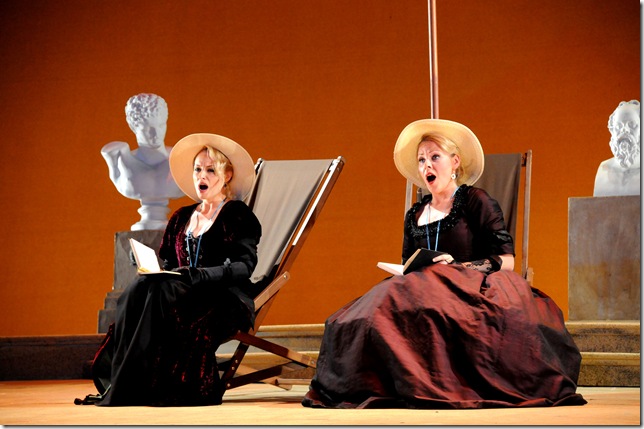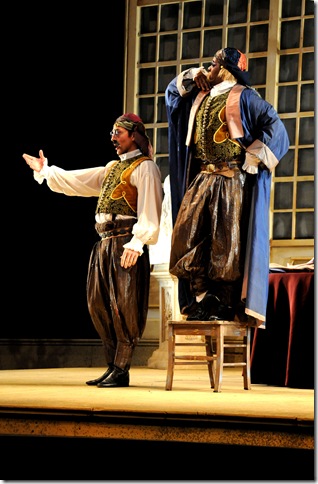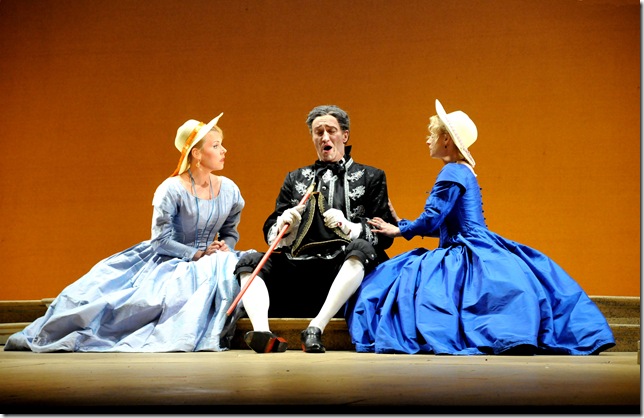The Palm Beach Opera is closing its three-year survey of the Mozart-Da Ponte operas with a somewhat minimalist but well-staged and ably sung production of Così fan Tutte.
Friday night found a cast of young, handsome singers working inside a Stephen Lawless reading of the opera that was easy to understand, almost plausible, and full of smart, interesting stage business that added depth to the action without overwhelming it or detracting from the elegance of the late-Mozart score.
If there wasn’t much exceptional singing Friday night, there nevertheless was plenty of good vocal work from each of the characters, particularly in the second act, which was noticeably more confident and lively than the first.
The Slovenian soprano Sabina Cvilak, making a return appearance to the house after her turn as Desdemona last season in Verdi’s Otello, made a good Fiordiligi, especially in her moments of peak emotional crisis in the second act. She has a strong, round voice with a nice darkness in the lower registers, and a highly polished finish throughout its compass.
Her work in the big second-act aria Per pietà ben mio was very impressive, with clean shifts in the jumps from top to bottom, and a persuasive interpretive sense of psychological turmoil. Her voice blended beautifully with that of her operatic sister, Lithuanian mezzo Jurgita Adamonyte (beginning with the Soave sia il vento in Act I), and she managed to make the most of a rather cool stage temperature.
Adamonyte, as Dorabella, was considerably warmer, in part because the character calls for it, but she also is an appealing actress who made her second-act duet with Guglielmo (Il core vi dono) delightful to watch. Like Cvilak she has a strong, well-rounded voice, and one with a little more presence.
Her E amore un ladroncello was charmingly sung, and her flirty, happy interpretation of it an excellent match for Dorabella, who too often is asked to present this aria through a sadder-but-wiser scrim of hard-won knowledge.
The men were equally solid. Tenor Norman Shankle, last season’s Cassio in Otello, has a lightly colored but forceful and flexible voice that’s ideal for Mozart. The added heat he brought to his singing in the crucial duet with Fiordiligi added a fresh, nervous color to the voice that was quite attractive.
Baritone David Adam Moore was a fine Guglielmo whose voice also has the right kind of weight and suppleness for Mozart. His acting was good, both solo and with Shankle, and his Donne mie, la fate a tanti had a definitive quality to it that made it memorable.
As Don Alfonso, the Italian bass Matteo Peirone was absolutely on point. He had just the right kind of smirky knowingness as the moral philosopher who sets this comedy in motion, and the conversational style of his firm, warm voice embodied the character every bit as much as his acting.
The role of Despina is a gift for a comic singer, and mezzo Abigail Nims was marvelous at it. She has a big voice with a sharp, cutting sound when she needs it, and she got the second act off to a wonderful start with her Una donna a quindici anni. The quality of her singing was apparent early in the first act, and not just with In uomini, in soldati: In the sextet before Fiordiligi’s Come scoglio, you could hear Nims tossing off those fast leaps at Io non so, se son Vallachi with pinpoint accuracy.
It’s worth pointing out here that this company has benefited in its last couple productions from the casting choices made by David Blackburn, the director of artistic operations. This Così cast was shrewdly assembled using voices of different colors, but with a broad unity of weight and agility; Nims’s voice, which had the tightest focus, added the perfect standout spice to the mix.
Italian conductor Gianluca Martinenghi led the fine Palm Beach Opera Orchestra very carefully, and in the first act kept the volume level way down beneath his singers. It struck me as something too cautious, with the result that some of Mozart’s wit and vigor were drained out of the music. One missed the usual fire of principal conductor Bruno Aprea, though Martinenghi did an expert job of keeping things moving, and the orchestra played quite well for him.
Stage director Lawless, a veteran of the Glyndebourne touring company, working with a simple, almost severe set from Peter Dean Beck and scenery from the Altanta Opera, fills the space with intelligent choices. When Dorabella and Despina hear out Fiordiligi’s anguish in Act II, they do so lying on a bed next to each other, heads to the audience and feet toward on the headboard, as Fiordiligi stalks the room. It adds a whimsical Tiger Beat feel to the scene that beautifully sums up the two points of view on the fidelity issue, and makes the situation believable for a modern audience.
Other clever bits include Benjamin Franklin’s key-and-kite lightning deliverer as a substitute for Dr. Mesmer’s magnet, and a continuing bit with two colored sashes worn by the women, which for Fiordiligi becomes something of a set of worry beads, and for Dorabella becomes an object of playful seduction in her duet with Guglielmo, which Friday night actually raised some sexual heat.
Greg Ritchey’s chorus was solid and effective, and Kathy Waszkelewicz’s costumes were excellent – elegant and lovely at all times for the women (even their undergarments at the opening of Act II), and getups for the “Albanians” that almost made them convincing.
Così fan Tutte will be performed at 7:30 p.m. today at the Kravis Center, with Caitlyn Lynch as Fiordiligi, Patricia Risley as Dorabella, Andrew Schroeder as Guglielmo and Joel Prieto as Ferrando. Friday night’s cast will return at 2 p.m. Sunday, and tonight’s cast will return at 2 p.m. Monday. Tickets start at $23. Call 833-7888 or visit www.pbopera.org, or call 832-7469 or visit www.kravis.org.


